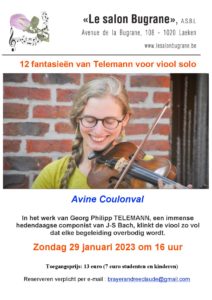
- Cet évènement est passé
12 Fantasies by Telemann for solo violin – Avine Coulonval
dimanche 29 janvier 2023 16 h 00 min 17 h 15 min
Reservation by email : brayerandreeclaude@gmail.com
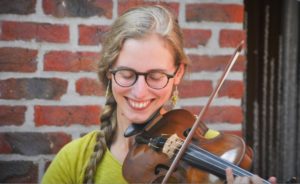
In a unique solo performance, Avine Coulonval will offer us more than an hour of pleasure to (re-)discover the
« 12 Fantasies for solo violin »
a remarkable work written in 1735 by Georg Philipp TELEMANN, an immense contemporary composer of J-S Bach
Avine COULONVAL began her musical apprenticeship, a keyboard under her fingers, at the age of 5. She also learned the violin, then later the cello and she finished the academy in both violin and piano with great distinction. In 2009, winner of the DEXIA Classics competition, she joined the Royal Conservatory of Liège, in the class of Philippe Koch, and graduated in June 2015.
She also studied chamber music with Jean-Gabriel Raelet and began a second master’s degree in violin at the IMEP in Namur in the class of Yossif Ivanov (violin) and Gilles Millet (chamber music).
For her, the essence of music lies in sharing, with the public, with the musicians and with her students. She began by playing in a duet with her brother, then continued in various orchestras and ensembles in her region.
Today, she is a founding member of the string ensemble « Duo d’âmes » (Avine came in this context with this ensemble to the Salon Bugrane in 2018) and enjoys exploring the sonata repertoire with pianist Eline Mathelart. She also plays in an orchestra.
Long leader of the second violins of the Dextuor ensemble, she participates in the contemporary ensemble « Sturm und Klang » directed by Thomas Vanhaeperen as well as in the Ensemble Orchestral Mosan.
To this day, she wants to devote her energy to chamber music, and deepen her experience around active pedagogy.
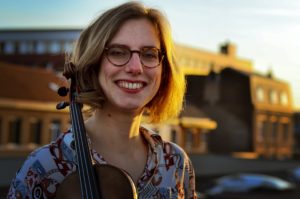
Twelve Fantasies for violin without bass (*)
A true summary of the master’s know-how, the collection offers a succession of short pieces, where a remarkable variety of styles reflects his perfect knowledge of the musical genres of the early 18th century. The 12 Fantasies are intended for the solo violin, something very rare in baroque music with the omnipresence of the basso continuo.
An accomplished violinist, Telemann knows the technique of his instrument thoroughly and makes it sound with such fullness that any accompaniment becomes superfluous. To do this, he simulates the presence of several instrumental parts on the violin according to an old process called the « luthe » style. This technique, derived from the lute, consists of « breaking up » the melody by alternating it in different registers. Thus, the Seventh Fantasy involves three low notes which interrupt the melody in the high register. The difference in sonority, obtained by both the change of string and pitch, therefore suggests several instrumental parts.
Another technique frequently used on the solo violin is that of the double strings, that is to say when two strings are played at the same time. But sometimes, as in the Allegro of the Second Fantasy, the score indicates three simultaneous notes, technically unrealizable as written. The composer, by adopting such a writing, evokes the simultaneity of sounds by arpeggiating the chords or by reducing the duration of certain notes, in order to ensure the continuity of the main melody.
The Twelve fantasies therefore appear as a pivotal work, representative of the transition that took place during the composer’s long life. Author of a colossal body of work, Telemann made a major contribution in the 18th century to the transformation of musical language in Europe. And his prodigious ease of invention earned him extraordinary notoriety.
Considered the greatest musician of his time, he even eclipsed Johann Sebastian Bach. By wanting to bring together all genres, Telemann contributes to the advent of an international style, and thus allows the evolution of a music moving towards classicism. »
Life of Georg Philipp Telemann (*)
« Georg Philipp Telemann (1681 – 1767) was one of the most prolific musicians in 18th century Germany. In its entire production – nearly 6,000 works, several of which have unfortunately been lost – there are twelve series of cantatas for the 52 Sundays of the year, around a hundred oratorios, 44 passions, more than 600 overtures à la française, 40 operas and numerous concertos, orchestral suites, quartets and sonatas.
This spectacular productivity is partly explained by the composer’s exceptional longevity: born four years before Bach, in the middle of the Baroque period, he died at the age of 86, when Haydn was laying the foundations of classicism.
A prodigiously gifted child, Telemann learned to play the violin, flute and harpsichord at an early age, and seemed hostile to any instruction in composition:
Self-taught, Telemann composed his first opera at the age of 12. But his mother enrolled him in law at the University of Leipzig, where he passed all his law exams with flying colors and was finally able to devote himself entirely to music.
He traveled a lot and first accepted, in 1704, the post of choirmaster to Count von Promnitz in Sorau. The young musician discovers Lully and Campra. Fascinated, Telemann composed more than 200 French overtures in less than two years. Then he left for the court of Eisenach, where he was appointed master of concerts, and met Jean-Sébastien Bach.
Often playing together, the two musicians became very close friends. It was not until 1721 that Telemann’s life settled in Hamburg as Director of Music, Cantor of the Johanneum and Director of the Opera. Despite a daunting task – including supervising the musical activity of the city’s five major churches, composing music for special occasions, in addition to teaching in two schools – he set up a new Collegium musicum to play his works, founds a musical journal, regularly sends Tafelmusik (table music) to the court of Eisenach, cantatas and oratorios to Frankfurt, as well as operas to Bayreuth, and this, not to mention his work as an engraver and publisher of his compositions. This prodigious vitality allows him to distribute his work throughout Germany, then abroad.
Also, the naturalness of his music, intended mainly to meet the tastes of the music-loving bourgeoisie who frequented concert halls, ensured him an international reputation. He then became the promoter of a new genre that heralded the language of classicism. It was in the midst of his overflowing activity in Hamburg that Telemann published, in 1735, the Twelve Fantasies for Violin without Bass.
(*) Extracts from an article by Sylvain Caron, musicologue.
THIS EVENT IS ALSO ACCESSIBLE ON FACEBOOK
The event could be broadcast online if the demand
is expressed by a sufficient audience
( Share with others and write about your opinion! )
https://www.facebook.com/events/646615683933620
( EN) EVENT ONLINE or OFFLINE :
https://www.facebook.com/events/646615683933620
https://www.facebook.com/events/3445485459021670
https://www.facebook.com/events/1112998322710511
— Downloadable flyers ( to be downloaded and/or shared) —
(EN) Downloadble Flyer ( JPEG-format) –> Flyer Avine Coulonval – 12 Fantaisies for solo violin (EN)
(EN) Downloadble Flyer ( PDF-format) –> Flyer Avine Coulonval – 12 Fantaisies for solo violin (EN)
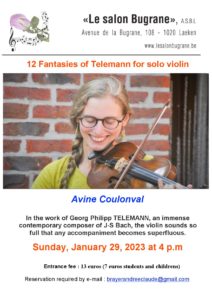
( FR) Flyer Téléchargeable ( format pdf) –> Flyer Aline Coulonval – 12 fantaisies pour violon seul (FR)
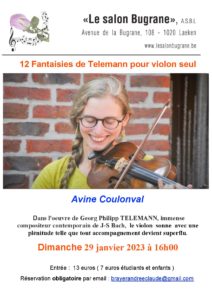
(NL) Downloadbare Flyer ( pdf-formaat) –> Flyer Avine Coulonval – 12 fantaisieën voor viool solo (NL)
